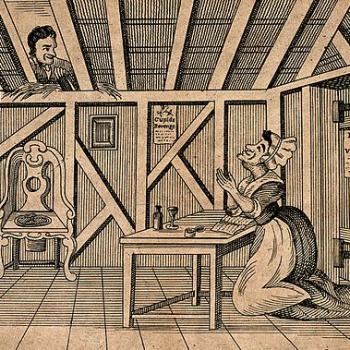The benefit of growing up within a religiously-minded community is that one is immersed in language about God. The liability of growing up in such a community is also that one is immersed in language about God. The benefit is that maybe the language helps us to recognize God when we encounter him for ourselves; but the liability is that the language may actually take the place of God, so we never see him for ourselves.
In my case, it was all benefit. I grew up comfortable in my practice of faith, made possible in part because I lived in a time and a place where bigotry had receded. Skokie, north of Chicago, was a place where neo-Nazis had tried to march, in part because of the large population of Jews who lived there. I, being only 7 years old at the time, was blissfully unaware that this proposed march was in the courts. I was barely aware that there was even a difference between me and my many Jewish friends.
I had been baptized at St. Lambert's Church and went to mass weekly. I went to CCD classes (that's "Confraternity of Christian Doctrine" those of us of a certain age recall), learned the Ten Commandments, and tried to love my neighbors. I remember my first reconciliation pretty well (face-to-face), but my first communion is a little fuzzy. Yes, there were felt banners and signing at guitar masses. This was, after all, only ten years or so after the end of the Second Vatican Council. But even at 7 I had a pretty good sense of what it meant to be Catholic.
My family moved out to Mount Prospect, further northwest, and I lived a happy childhood, never really questioning my faith. I went to CCD at St. Thomas à Becket Church and later had a great experience of youth ministry there. Many of my friends were Catholic, but by junior high I began to be aware that there were friends at other churches or synagogues.
It was in eighth grade that the first real faith decision happened: I told my parents I wanted to go to a Catholic high school. I can't say fully what motivated that decision, but it was a certainty I can only attribute to grace. Perhaps it was the inchoate sense that if I professed to believe what we prayed about on Sundays, then it really couldn't be something that happened only once a week. On some level I wanted my education to involve thinking clearly about faith.
The first lesson that emerged in that environment is that thinking about faith required as much rigor as analyzing literature, learning algebra, or performing lab experiments. My love for the Jesuit tradition began at Loyola Academy in Wilmette, where I encountered men and women, lay people and Jesuit priests and brothers committed to living a faith rooted in the life of the mind and lived in service to others. It is clear, in retrospect, how much of the life of faith we learn by imitation: I learned by watching and listening to those whom I respected and admired. As I grew, I came to inhabit a faith and develop a sense of self.
Yet even in that period there was something I lacked. I knew the language and symbols of my faith. I knew its teachings, in large part due to enthusiastic theology teachers. I was committed to service, working frequently at the Howard Area Community Center and spending time over one summer in an inner-city immersion program with a family from Mexico. I had learned much about living out of a commitment of faith: but I did not yet know God as a person.
That changed on a Kairos retreat at the end of my junior year. It was then that God really got my attention, when I spoke no longer of God in the third person. I spoke to God, because God spoke to me. What was the experience like? Quite simply, it was one of overwhelming love. It was not a mystical experience like those I have since studied. It was more like an all-encompassing change in the way I looked at the world, a new gestalt, rooted not in anything I did but rather in what I at that moment was able to receive.
In light of that experience, I find it difficult to accept fully the idea that God is something people create for themselves. Clearly some people do create gods in their image, but in my experience—confirmed many times since in the research and writing I have done in the history and practice of Christian spirituality—God reached me because I had sufficiently let down my defenses to let him reach me, and I welcomed him. And since that time I have never really had a crisis of faith, because faith is no longer a matter of my intellect or my good choices or the books I read or the political positions I take. Faith is simply about listening to the God I continually encounter in prayer.
Language about God is always woefully inadequate to the task of allowing a person to really encounter God. It's rather like the friend who, after trying to describe a movie he likes, gives up and says, "You just gotta go see that movie!" I am moved by the story of Saint Thomas Aquinas, who wrote massive tomes on theology but who, at the end of his life, said it all amounted to straw before the reality of God. The best that language can do is help us to look forward to meeting God, and help us remove anything that gets in the way of God. For when God comes—and I believe firmly that he comes to everyone—we must welcome him in freedom.
4/11/2011 4:00:00 AM





